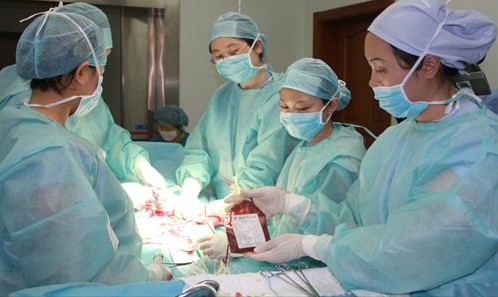 |
| Medical staff collect umbilical cord blood during a C-section. |
"The only chance your baby will ever have."
"A safeguard for your child's future health."
"A gift to the human race from newborns."
These are the emotional slogans on the brochures about umbilical cord blood preservation which are regularly handed out at some Beijing maternity hospitals. They draw expectant parents to hospital information desks, trying to make sense of the unfamiliar medical jargon.
Wu Fan (pseudonym), a 28-year-old pregnant woman at a maternity hospital in Chaoyang district, admitted that the process confused her, but she and her husband still decided to pay the 19,800 yuan ($3,234) for 18 years of storage at Beijing Cord Blood Bank.
"Many of our friends banked their children's cord blood. We just wanted to do the same, though we don't understand precisely how it works," said Wu, who is 28 weeks pregnant.
The hematopoietic stem cells found in cord blood have been used to cure serious diseases like cancer, hemophilia and leukemia.
A staffer from a Beijing Cord Blood Bank information desk, surnamed Li, said that the process has increased in popularity as the public learns more about the benefits of preservation, when reached by a Metropolitan reporter posing as the relative of a pregnant woman.
As of 2012, some 20 percent of pregnant women in China opted to bank their newborns' cord blood, a tenfold increase from 2002, according to a September 2012 report in the Beijing News.
"I think cord blood banking is safe because the bank works with hospitals," said a woman surnamed Wang, who gave birth a month ago. "My friend was asked in the delivery room whether she wanted to bank the cord blood, soon after she gave birth, even though she hadn't signed a contract or previously expressed interest."
However, not every new parent believes that cord blood banking can offer future miracle cures for their child. Others have doubts about the freezing storage techniques or wonder whether the cord blood banks are exaggerating the efficacy of cord blood.
"I won't pay to store my baby's cord blood; I think the banks are more concerned with making a profit," said Liu Xiaoming, a woman who is 32 weeks pregnant. "I've read about that scandal at a Shanghai bank about storing tainted blood in 2008. I don't have enough confidence in their honesty."
The International Federation of Gynecology and Obstetrics discourages parents from banking their newborns' cord blood. Their ethical guidelines state: "There are no guarantees of the commercial continuation of these companies, or the successful storage of viable stem cells should they be needed for transplantation."
The Beijing Cord Blood Bank responded by saying they follow all laws and regulations. Its website touts the fact that they were accredited by the American Association of Blood Banks (AABB) in March 2013, an international certification of its quality excellence of providing cord blood processing and storage services.
In contrast to the debate about cord blood banking for self-use, there seems to be greater acceptance of umbilical cord blood being donated for other patients.
Li said that the testing process necessary for donation is more rigorous but the storage techniques and quality assurances remain the same.
Liu, the expectant mother who had ruled out banking her baby's cord blood, ultimately decided to donate it. If it can help save someone else's life, she reasoned, that good deed would end up being a better gift for her newborn.
 Mexican president delivers first State of Nation address
Mexican president delivers first State of Nation address Highlights of MAKS 2013 Int'l Aviation and Space Show
Highlights of MAKS 2013 Int'l Aviation and Space Show  Top 10 Chinese provinces for the well-heeled
Top 10 Chinese provinces for the well-heeled  Baby born to save his sister - the story of a savior sibling
Baby born to save his sister - the story of a savior sibling Lady of mystery: Female SWAT team in prison disclosed
Lady of mystery: Female SWAT team in prison disclosed  Single mother, baby live in KFC restaurant for months
Single mother, baby live in KFC restaurant for months Fan Bingbing poses for Malaysian magazine Citta Bella
Fan Bingbing poses for Malaysian magazine Citta Bella Zhang Xinyi covers COSMOPOLITAN
Zhang Xinyi covers COSMOPOLITAN A collection of bizarre rooftop buildings around China
A collection of bizarre rooftop buildings around China Putin intimate contacts with marine animals
Putin intimate contacts with marine animals China's frigate 'Bengbu'in fire training
China's frigate 'Bengbu'in fire training 'Abandoned' life in cement boats in Huai River
'Abandoned' life in cement boats in Huai River 2013 Taiwan Int'l Tourism Expo kicks off in Taipei
2013 Taiwan Int'l Tourism Expo kicks off in Taipei Photo story: Take a gap year
Photo story: Take a gap year Nokia's Global Headquarters: visiting a declining empire
Nokia's Global Headquarters: visiting a declining empireDay|Week|Month